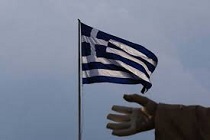Countries which are connected globally have a contagion effect, so if one market falls on the trap, the other market has the odds of falling on same track. Does Greece crisis show evidence for this? Greece has just got its third bailout and it is one of the trading partners of India, will that have any implications on the Indian economy?
Though India’s exports to Greece form a meagre $381mn (0.14% of total exports), India’s trade with EU is significantly high, where the leading countries are UK, Germany and Switzerland. Current scenario in FX market shows that, the Euro stands at a risk of high volatility and likelihood of Euro to depreciate against dollar are high. As India’s major trading partner is EU, it will hit India’s exports (esp., software and engineering exports) negatively, since India ought to receive fewer Euros in exchange to rupee for its exports which stand at $56.9 bn to European countries.
The world financial markets operate on the basis of certain conservatism, where; if one market falls, institutional investors tend to withdraw their investments from developing markets to safe guard their money. Greece is a part of EU, to whom the exports from India is around 40% of its total exports and this association with troubling European economy makes India look more vulnerable. But the aforementioned scenario will occur only when the Greece crisis trigger other struggling European nations like Spain and Italy to follow the queue of Greece and worsen the situation in EU. The resulting EU crisis will increase the volatility of Indian capital market due to flight of foreign investment which in turn affects the rupee.
Situations like these push the prices of bond market higher and it will lead to higher borrowing costs. Higher borrowing costs would lead to higher amount paid for imports, which will in turn lead to inflation. Apart from Greece crisis, country’s domestic factors will determine the market outlook in long term though market shock prevails. India cannot afford external factors contributing towards worsening the business outlook. It is indeed heartening that the government had sensed the challenges as early as in 2012 and had decided to cut down its exports to EU and channelled the same towards developing economies. Though the earnings will not be as high as those in developed economies, there is at least greater amount of guarantee in terms of investment being safe.
The best reference to this situation can be when the Indian rupee came to a 13 month low of Rs.63.59 against USD when Russian central bank hiked their interest rate from 10.5% to 17% to attract foreign funds and Sensex slumped 583 points (Dec’17,2014) and it was not entirely driven by domestic factors. Though falling oil prices caused it, India had to bear the brunt. The above mentioned situation might trigger currency risk pulling all the economies to suffer. After struggling for a long time to put India on track by containing Inflation target, stabilising rupee, servicing the CAD through favourable oil prices, any impact from Greece crisis will give tough time for India to bounce back.
The situation though is unfavourable; India can still capitalize on the opportunity. The value and demand for dollar will probably increase against euro and USD appreciation could make Janet Yellen, Chair of the Federal Reserve to rethink about interest rate hike. It will lead to favourable market scenario for India and other developing economies. Indian markets tumbled intraday but closed in green signal which shows that it was just a knee-jerk reaction and the Indian economy will not be impacted for a long period of time, since it has been safeguarded by diverting the exports to UAE, Asian and African economies. Hence, short term volatility is only due to panic prevailed due to Greece bailout and Indian economy is determined mainly by domestic factors like interest rates, inflation, trade etc. It can be concluded that, though the Greece crisis does pose an indirect threat to export earnings and currency depreciation, India is well prepared with adequate foreign exchange reserves of $353.648bn. Greece crisis shall persist. But shall not be a major threat to the growth of India.
Click here for government certification in Accounting, Banking & Finance





20 Comments. Leave new
Well researched. Very well articulated. Good job 🙂
nice one
good
Well researched. Good job.
Great work☺
Superb work done!!! nice article
nice
Well written
well researched 🙂
Good call by connecting Greece and Indian economy
well researched!!
Nice
well researched topic and nicely linked to Indian economy 🙂
nice
great work…
Indeed a good work 🙂
Informative. A must read!
Great work!
Your article indirectly highlights the immense interconnectedness of this globalised world. The Greece crisis has been explained well in your article. Good work.
Well researched